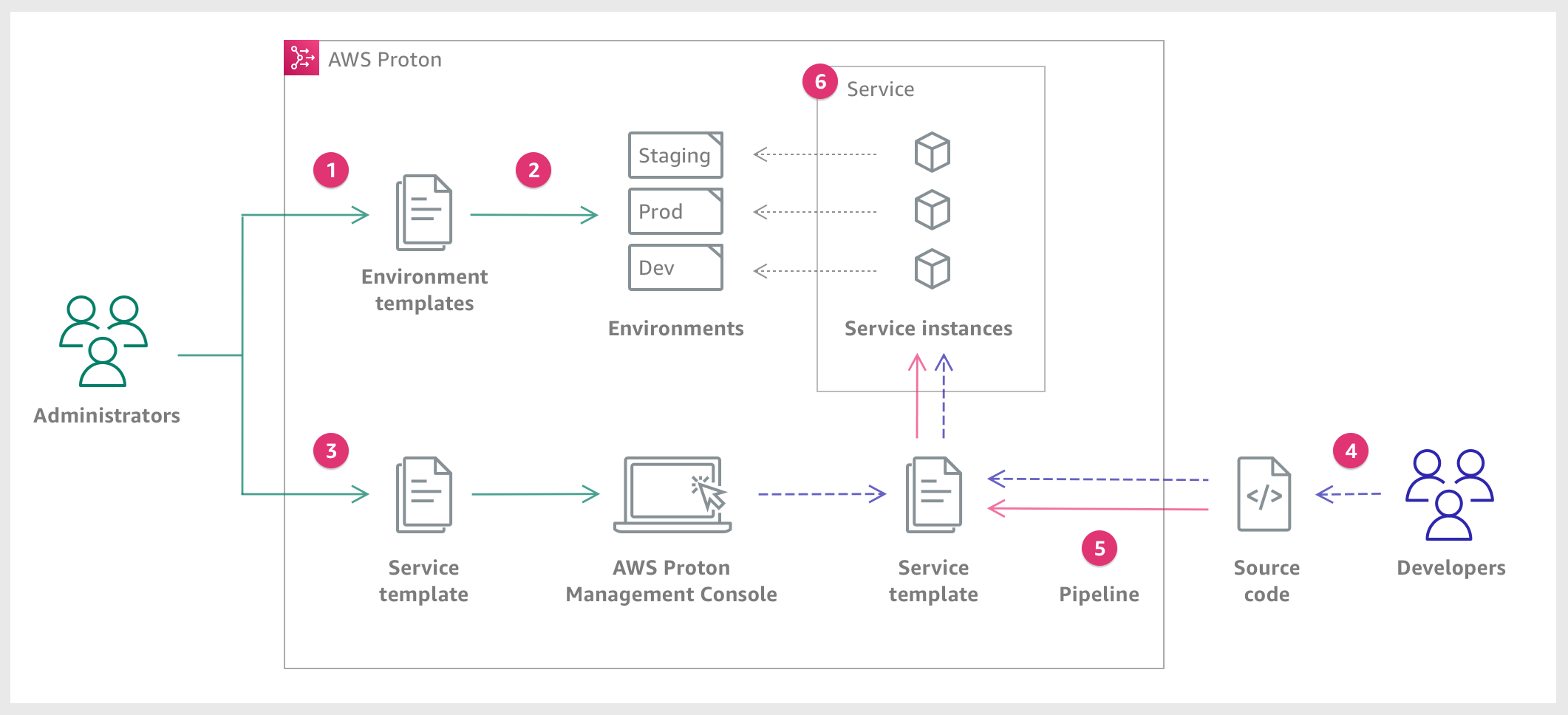End of support notice: On October 7, 2026, AWS will end support for AWS Proton. After October 7, 2026, you will no longer be able to access the AWS Proton console or AWS Proton resources. Your deployed infrastructure will remain intact. For more information, see AWS Proton Service Deprecation and Migration Guide.
What is AWS Proton?
AWS Proton is:
-
Automated infrastructure as code provisioning and deployment of serverless and container-based applications
The AWS Proton service is a two-pronged automation framework. As an administrator, you create versioned service templates that define standardized infrastructure and deployment tooling for serverless and container-based applications. As an application developer, you can select from the available service templates to automate your application or service deployments.
AWS Proton identifies all existing service instances that are using an outdated template version for you. As an administrator, you can request AWS Proton to upgrade them with one click.
-
Standardized infrastructure
Platform teams can use AWS Proton and versioned infrastructure as code templates. They can use these templates to define and manage standard application stacks that contain the architecture, infrastructure resources, and the CI/CD software deployment pipeline.
-
Deployments integrated with CI/CD
When developers use the AWS Proton self-service interface to select a service template, they're selecting a standardized application stack definition for their code deployments. AWS Proton automatically provisions the resources, configures the CI/CD pipeline, and deploys the code into the defined infrastructure.
AWS Proton for platform teams
As an administrator, you or members of your platform team, create environment templates and service templates containing infrastructure as code. The environment template defines shared infrastructure used by multiple applications or resources. The service template defines the type of infrastructure that's needed to deploy and maintain a single application or microservice in an environment. An AWS Proton service is an instantiation of a service template, which normally includes several service instances and a pipeline. An AWS Proton service instance is an instantiation of a service template in a specific environment. You or others in your team can specify which environment templates are compatible with a given service template. For more information about templates, see AWS Proton templates.
You can use the following infrastructure as code providers with AWS Proton:
AWS Proton for developers
As an application developer, you select a standardized service template that AWS Proton uses to create a service that deploys and manages your application in a service instance. An AWS Proton service is an instantiation of a service template, which normally includes several service instances and a pipeline.
AWS Proton workflow
The following diagram is a visualization of the main AWS Proton concepts discussed in the preceding paragraph. It also offers a high-level overview of what constitutes a simple AWS Proton workflow.

 As an Administrator, you create and register an Environment Template
with AWS Proton, which defines the shared resources.
As an Administrator, you create and register an Environment Template
with AWS Proton, which defines the shared resources.
 AWS Proton deploys one or more Environments, based on an Environment
Template.
AWS Proton deploys one or more Environments, based on an Environment
Template.
 As an Administrator, you create and register a Service Template
with AWS Proton, which defines the related infrastructure, monitoring, and CI/CD resources as well as compatible Environment
Templates.
As an Administrator, you create and register a Service Template
with AWS Proton, which defines the related infrastructure, monitoring, and CI/CD resources as well as compatible Environment
Templates.
 As a Developer, you select a registered Service Template and
provide a link to your Source code repository.
As a Developer, you select a registered Service Template and
provide a link to your Source code repository.
 AWS Proton provisions the Service with a CI/CD Pipeline for your
Service instances.
AWS Proton provisions the Service with a CI/CD Pipeline for your
Service instances.
 AWS Proton provisions and manages the Service and the Service
Instances that are running the Source code as was defined in the selected Service
Template. A Service Instance is an instantiation of the selected Service
Template in an Environment for a single stage of a Pipeline (for example
Prod).
AWS Proton provisions and manages the Service and the Service
Instances that are running the Source code as was defined in the selected Service
Template. A Service Instance is an instantiation of the selected Service
Template in an Environment for a single stage of a Pipeline (for example
Prod).